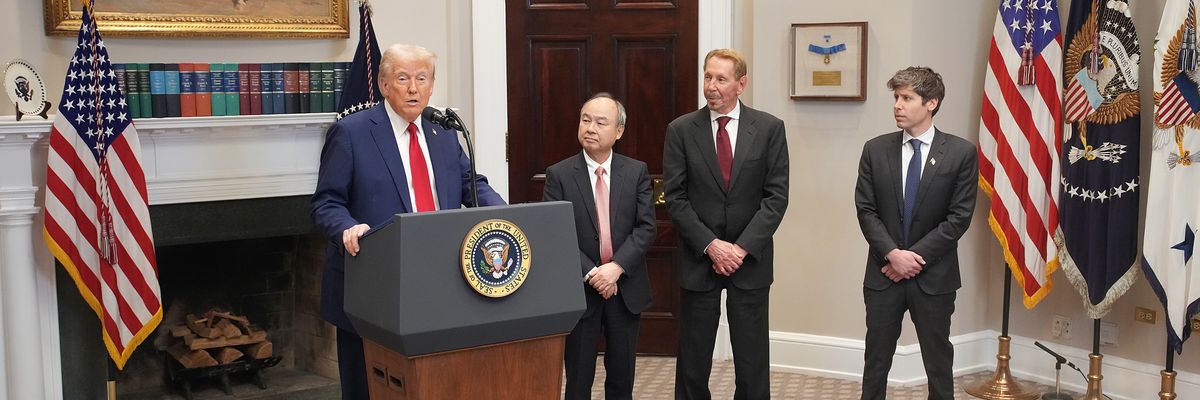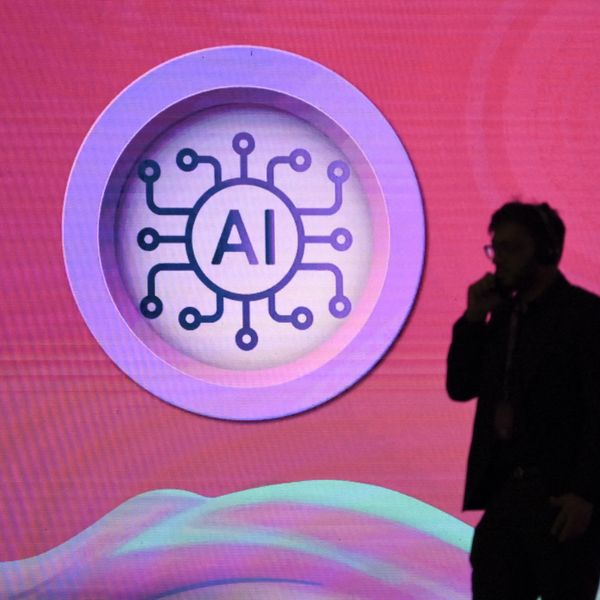
U.S. President Donald Trump speaks in the Roosevelt Room of the White House while SoftBank CEO Masayoshi Son, Oracle CTO Larry Ellison, and OpenAI CEO Sam Altman look on on January 21, 2025 in Washington, DC.
Watchdog Says Trump-Backed AI Data Center Push 'Raises Massive Antitrust Concerns'
"Even if it turns out to be structured to avoid antitrust law enforcement, it plainly will concentrate power in a small number of corporate hands," said Public Citizen co-president Robert Weissman.
U.S. President Donald Trump on Tuesday highlighted a new private-sector initiative to invest as much as $500 billion over four years into developing infrastructure to support artificial intelligence, starting with a raft of power-intensive data centers in Texas. The move drew swift criticism from one watchdog group on antitrust and environmental grounds.
The initiative, Stargate, is a joint venture of the tech firms OpenAI, Oracle, and SoftBank. Trump hosted the leaders of those companies—OpenAI CEO Sam Altman, Oracle Chairman Larry Ellison, and SoftBank CEO Masayoshi Son—at the White House to announce the initiative just one day after he signed an executive order rolling back a Biden-era executive order implemented in 2023 that sought to put safeguards on AI.
"I think this will be the most important project of this era," said Altman, according to the Washington Post. "We wouldn't be able to do this without you, Mr. President," he added, though both the Post and and the Associated Press noted that the creation of the partnership predated Trump's return to the White House.
Biden's 2023 executive order on AI placed safety obligations on AI developers and called on federal agencies to examine the technology's risks. But Biden, too, was interested in boosting AI infrastructure development. Right before he departed, in early mid-January, Biden signed an executive order directing federal agencies to identify government sites that could be leased to private companies for the construction of AI data centers.
Environmental groups and tech advocacy groups have long advocated for greater safeguards on AI, pointing to the technology's potential impact on the climate emergency.
The average query in the AI-powered chatbot ChatGPT requires 10 times the amount of energy a Google search needs, and "in that difference lies a coming sea change in how the U.S., Europe, and the world at large will consume power—and how much that will cost," according to a 2024 analysis published by the investment firm Goldman Sachs. Goldman Sachs analysts believe that AI will represent about 19% of data center power demand by 2028.
AI infrastructure is also water intensive. Global AI demand is projected to require more water extraction in a year than the country of Denmark by 2027, according to one study.
"The alarming surge in these centers' energy demand is on track to extend the fossil fuel era... [and] it is already increasing costs for some consumers and threatens to bring about a larger affordability crisis, while lining the pockets of Big Tech billionaires," said Karen Orenstein, a director at the environmental group Friends of the Earth, following Biden's January executive order. "For the sake of our planet and its people, we need to rein in Big Tech and regulate AI," she said.
Meanwhile, the joint venture to build out AI infrastructure has also drawn scrutiny from one watchdog group over concerns of corporate concentration.
Public Citizen co-president Robert Weissman said Wednesday that "the new Stargate plan—at minimum—raises massive antitrust concerns. Even if it turns out to be structured to avoid antitrust law enforcement, it plainly will concentrate power in a small number of corporate hands."
"Absent a commitment to bring on new, renewable energy to power an even greater spike in AI power demand, the Stargate build out threatens to worsen the rush to climate catastrophe and to drive up consumer electric bills," he added.
Another observer, Jeffrey Westling of the American Action Forum, remarked on the timing of the announcement.
"Interesting to wait to announce this until the Trump Admin. Assuming its all private investment, maybe they were worried about FTC/DOJ antitrust scrutiny?" he wrote on X Tuesday.
An Urgent Message From Our Co-Founder
Dear Common Dreams reader, The U.S. is on a fast track to authoritarianism like nothing I've ever seen. Meanwhile, corporate news outlets are utterly capitulating to Trump, twisting their coverage to avoid drawing his ire while lining up to stuff cash in his pockets. That's why I believe that Common Dreams is doing the best and most consequential reporting that we've ever done. Our small but mighty team is a progressive reporting powerhouse, covering the news every day that the corporate media never will. Our mission has always been simple: To inform. To inspire. And to ignite change for the common good. Now here's the key piece that I want all our readers to understand: None of this would be possible without your financial support. That's not just some fundraising cliche. It's the absolute and literal truth. We don't accept corporate advertising and never will. We don't have a paywall because we don't think people should be blocked from critical news based on their ability to pay. Everything we do is funded by the donations of readers like you. Will you donate now to help power the nonprofit, independent reporting of Common Dreams? Thank you for being a vital member of our community. Together, we can keep independent journalism alive when it’s needed most. - Craig Brown, Co-founder |
U.S. President Donald Trump on Tuesday highlighted a new private-sector initiative to invest as much as $500 billion over four years into developing infrastructure to support artificial intelligence, starting with a raft of power-intensive data centers in Texas. The move drew swift criticism from one watchdog group on antitrust and environmental grounds.
The initiative, Stargate, is a joint venture of the tech firms OpenAI, Oracle, and SoftBank. Trump hosted the leaders of those companies—OpenAI CEO Sam Altman, Oracle Chairman Larry Ellison, and SoftBank CEO Masayoshi Son—at the White House to announce the initiative just one day after he signed an executive order rolling back a Biden-era executive order implemented in 2023 that sought to put safeguards on AI.
"I think this will be the most important project of this era," said Altman, according to the Washington Post. "We wouldn't be able to do this without you, Mr. President," he added, though both the Post and and the Associated Press noted that the creation of the partnership predated Trump's return to the White House.
Biden's 2023 executive order on AI placed safety obligations on AI developers and called on federal agencies to examine the technology's risks. But Biden, too, was interested in boosting AI infrastructure development. Right before he departed, in early mid-January, Biden signed an executive order directing federal agencies to identify government sites that could be leased to private companies for the construction of AI data centers.
Environmental groups and tech advocacy groups have long advocated for greater safeguards on AI, pointing to the technology's potential impact on the climate emergency.
The average query in the AI-powered chatbot ChatGPT requires 10 times the amount of energy a Google search needs, and "in that difference lies a coming sea change in how the U.S., Europe, and the world at large will consume power—and how much that will cost," according to a 2024 analysis published by the investment firm Goldman Sachs. Goldman Sachs analysts believe that AI will represent about 19% of data center power demand by 2028.
AI infrastructure is also water intensive. Global AI demand is projected to require more water extraction in a year than the country of Denmark by 2027, according to one study.
"The alarming surge in these centers' energy demand is on track to extend the fossil fuel era... [and] it is already increasing costs for some consumers and threatens to bring about a larger affordability crisis, while lining the pockets of Big Tech billionaires," said Karen Orenstein, a director at the environmental group Friends of the Earth, following Biden's January executive order. "For the sake of our planet and its people, we need to rein in Big Tech and regulate AI," she said.
Meanwhile, the joint venture to build out AI infrastructure has also drawn scrutiny from one watchdog group over concerns of corporate concentration.
Public Citizen co-president Robert Weissman said Wednesday that "the new Stargate plan—at minimum—raises massive antitrust concerns. Even if it turns out to be structured to avoid antitrust law enforcement, it plainly will concentrate power in a small number of corporate hands."
"Absent a commitment to bring on new, renewable energy to power an even greater spike in AI power demand, the Stargate build out threatens to worsen the rush to climate catastrophe and to drive up consumer electric bills," he added.
Another observer, Jeffrey Westling of the American Action Forum, remarked on the timing of the announcement.
"Interesting to wait to announce this until the Trump Admin. Assuming its all private investment, maybe they were worried about FTC/DOJ antitrust scrutiny?" he wrote on X Tuesday.
- As Trump Takes Office, It’s Time for a Mass Climate Movement ›
- 'Unsettling New Milestone': Top 12 US Billionaires Now Control $2 Trillion in Wealth ›
- Critics Warn Trump EPA Pick Zeldin 'Will Make Our Air and Water Dirtier' to Enrich Polluters ›
- Opinion | DeepSeek Gives the Lie to the Fossil Fuel Industry’s Latest Stalling Tactic | Common Dreams ›
- To Counter Trump, Coalition Launches People's AI Action Plan | Common Dreams ›
- Opinion | How to Make Sure People and the Planet Don’t Pay for the Data Center Buildout | Common Dreams ›
- Cheers Erupt as Tucson City Council Unanimously Kills Massive Amazon-Linked Data Centers | Common Dreams ›
- Report Details How 'Gas-Fed AI Boom' Set to Blow Up US Climate Goals | Common Dreams ›
- Watchdog Denounces Trump AI Order Seen as Giveaway to Big Tech Billionaire Buddies Like David Sacks | Common Dreams ›
U.S. President Donald Trump on Tuesday highlighted a new private-sector initiative to invest as much as $500 billion over four years into developing infrastructure to support artificial intelligence, starting with a raft of power-intensive data centers in Texas. The move drew swift criticism from one watchdog group on antitrust and environmental grounds.
The initiative, Stargate, is a joint venture of the tech firms OpenAI, Oracle, and SoftBank. Trump hosted the leaders of those companies—OpenAI CEO Sam Altman, Oracle Chairman Larry Ellison, and SoftBank CEO Masayoshi Son—at the White House to announce the initiative just one day after he signed an executive order rolling back a Biden-era executive order implemented in 2023 that sought to put safeguards on AI.
"I think this will be the most important project of this era," said Altman, according to the Washington Post. "We wouldn't be able to do this without you, Mr. President," he added, though both the Post and and the Associated Press noted that the creation of the partnership predated Trump's return to the White House.
Biden's 2023 executive order on AI placed safety obligations on AI developers and called on federal agencies to examine the technology's risks. But Biden, too, was interested in boosting AI infrastructure development. Right before he departed, in early mid-January, Biden signed an executive order directing federal agencies to identify government sites that could be leased to private companies for the construction of AI data centers.
Environmental groups and tech advocacy groups have long advocated for greater safeguards on AI, pointing to the technology's potential impact on the climate emergency.
The average query in the AI-powered chatbot ChatGPT requires 10 times the amount of energy a Google search needs, and "in that difference lies a coming sea change in how the U.S., Europe, and the world at large will consume power—and how much that will cost," according to a 2024 analysis published by the investment firm Goldman Sachs. Goldman Sachs analysts believe that AI will represent about 19% of data center power demand by 2028.
AI infrastructure is also water intensive. Global AI demand is projected to require more water extraction in a year than the country of Denmark by 2027, according to one study.
"The alarming surge in these centers' energy demand is on track to extend the fossil fuel era... [and] it is already increasing costs for some consumers and threatens to bring about a larger affordability crisis, while lining the pockets of Big Tech billionaires," said Karen Orenstein, a director at the environmental group Friends of the Earth, following Biden's January executive order. "For the sake of our planet and its people, we need to rein in Big Tech and regulate AI," she said.
Meanwhile, the joint venture to build out AI infrastructure has also drawn scrutiny from one watchdog group over concerns of corporate concentration.
Public Citizen co-president Robert Weissman said Wednesday that "the new Stargate plan—at minimum—raises massive antitrust concerns. Even if it turns out to be structured to avoid antitrust law enforcement, it plainly will concentrate power in a small number of corporate hands."
"Absent a commitment to bring on new, renewable energy to power an even greater spike in AI power demand, the Stargate build out threatens to worsen the rush to climate catastrophe and to drive up consumer electric bills," he added.
Another observer, Jeffrey Westling of the American Action Forum, remarked on the timing of the announcement.
"Interesting to wait to announce this until the Trump Admin. Assuming its all private investment, maybe they were worried about FTC/DOJ antitrust scrutiny?" he wrote on X Tuesday.
- As Trump Takes Office, It’s Time for a Mass Climate Movement ›
- 'Unsettling New Milestone': Top 12 US Billionaires Now Control $2 Trillion in Wealth ›
- Critics Warn Trump EPA Pick Zeldin 'Will Make Our Air and Water Dirtier' to Enrich Polluters ›
- Opinion | DeepSeek Gives the Lie to the Fossil Fuel Industry’s Latest Stalling Tactic | Common Dreams ›
- To Counter Trump, Coalition Launches People's AI Action Plan | Common Dreams ›
- Opinion | How to Make Sure People and the Planet Don’t Pay for the Data Center Buildout | Common Dreams ›
- Cheers Erupt as Tucson City Council Unanimously Kills Massive Amazon-Linked Data Centers | Common Dreams ›
- Report Details How 'Gas-Fed AI Boom' Set to Blow Up US Climate Goals | Common Dreams ›
- Watchdog Denounces Trump AI Order Seen as Giveaway to Big Tech Billionaire Buddies Like David Sacks | Common Dreams ›

